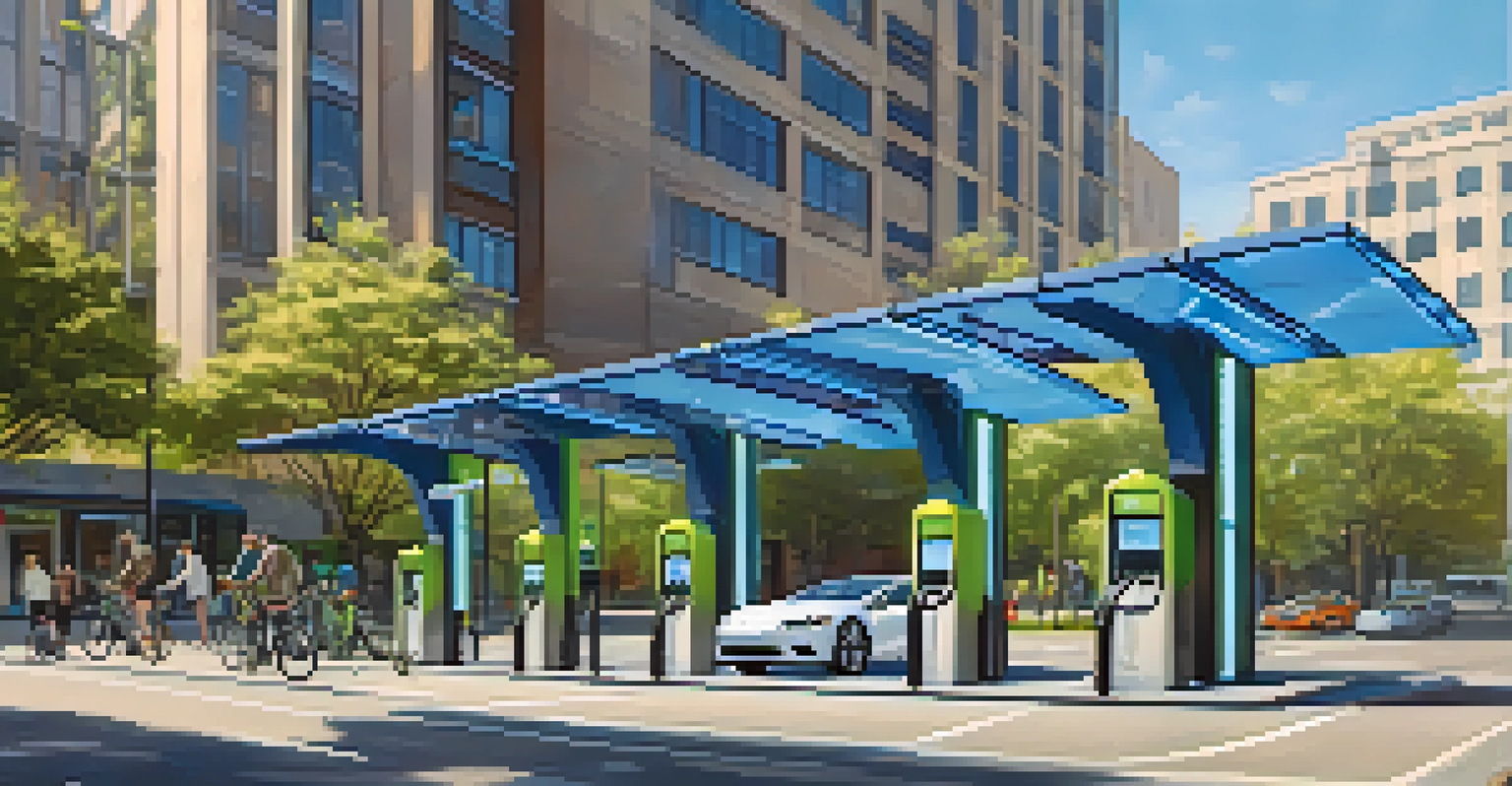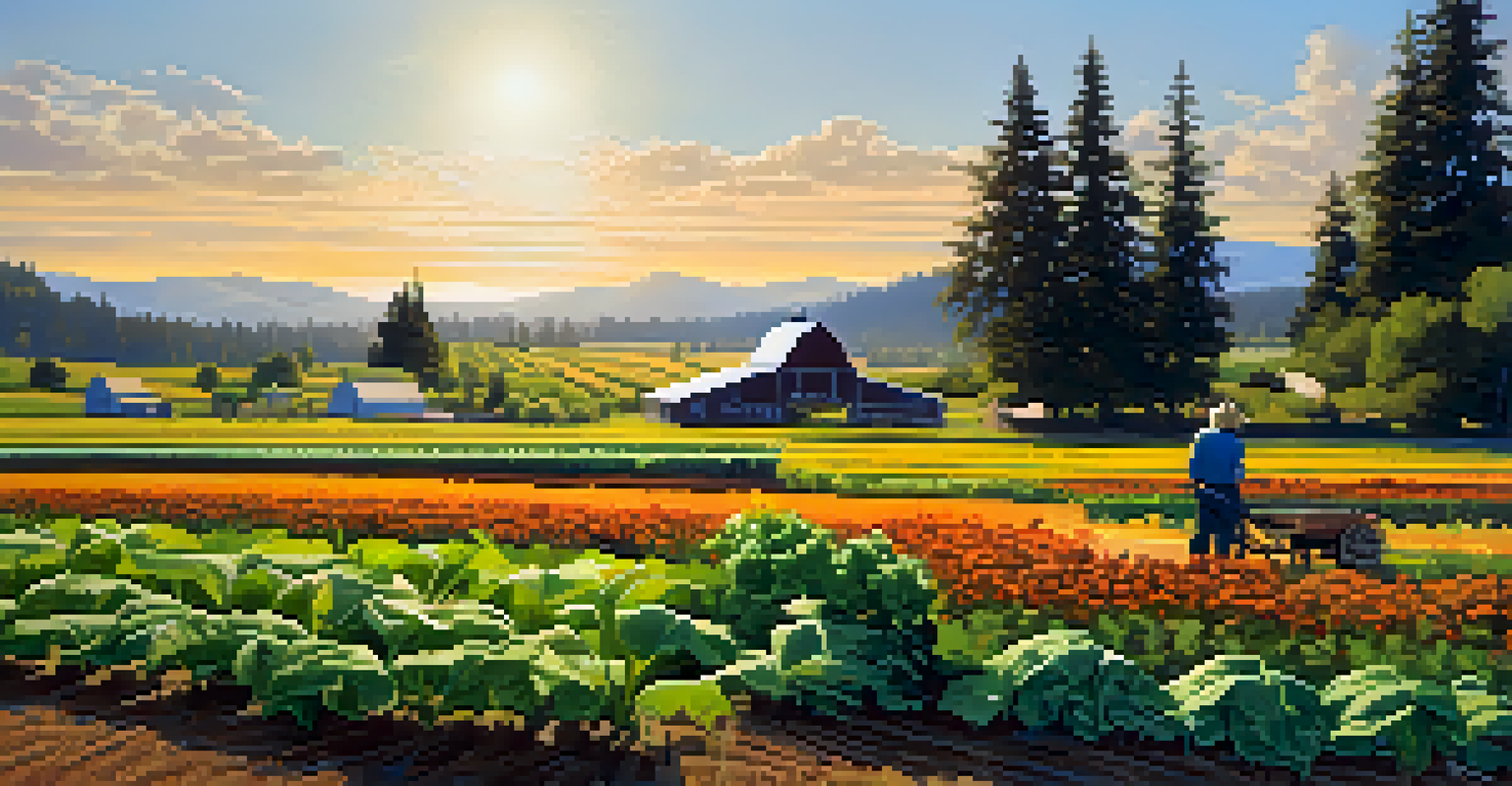Green Economy: Washington State's Push for Sustainable Growth

Understanding the Green Economy Concept
The green economy refers to an economic model that prioritizes sustainability and environmental health. It seeks to improve human well-being while reducing environmental risks and ecological scarcities. In essence, it's about finding a balance between economic growth and preserving our planet for future generations.
The economy is a wholly owned subsidiary of the environment, not the other way around.
This shift towards a green economy is essential in combating climate change and fostering sustainable practices. By promoting industries that focus on renewable energy, sustainable agriculture, and eco-friendly technologies, we can create a more resilient economy. Washington State is at the forefront of this transition, taking significant steps to lead by example.
Ultimately, the green economy is not just an environmental issue; it's a social and economic opportunity. It encourages job creation in new sectors while ensuring that communities thrive in a healthy environment. This holistic approach is vital for long-term sustainability.
Washington State's Commitment to Sustainability
Washington State has made impressive strides in promoting sustainability across various sectors. The state government has implemented policies aimed at reducing carbon emissions, encouraging renewable energy sources, and enhancing public transportation. These initiatives reflect a commitment to not only environmental health but also economic resilience.

One notable program is the Clean Energy Transformation Act, which aims to transition the state to 100% clean electricity by 2045. This ambitious goal sets a clear standard for other states to follow and showcases Washington's leadership in the fight against climate change. By investing in renewable energy, the state is also creating thousands of new jobs.
Green Economy Enhances Well-Being
The green economy aims to improve human well-being while minimizing environmental risks and fostering sustainable practices.
In addition, Washington has fostered partnerships between public and private sectors to drive innovation in sustainability. Collaborations with local businesses and non-profits help develop cutting-edge solutions that address environmental challenges while boosting the economy.
The Role of Renewable Energy in Growth
Renewable energy plays a crucial role in Washington's green economy strategy. The state is rich in natural resources, particularly hydropower, which supplies a significant portion of its energy needs. This reliance on clean energy sources reduces greenhouse gas emissions and showcases the benefits of sustainability.
Sustainability is no longer about doing less harm. It's about doing more good.
Furthermore, Washington is investing in other forms of renewable energy, such as solar and wind power. These investments not only diversify the energy portfolio but also create jobs and stimulate local economies. A growing demand for clean energy technologies is encouraging innovation and entrepreneurship across the state.
By harnessing renewable energy, Washington State is setting a benchmark for environmental responsibility. This commitment not only helps mitigate climate change but also ensures energy security for future generations, demonstrating that sustainable growth is possible.
Sustainable Agriculture Initiatives
Sustainable agriculture is another pillar of Washington's green economy, focusing on practices that protect the environment while enhancing food security. The state promotes organic farming, crop rotation, and integrated pest management to minimize the ecological footprint of agriculture. These methods ensure healthier soil and ecosystems.
Programs like the Washington State Department of Agriculture’s (WSDA) Organic Food Program support farmers in transitioning to organic practices. This assistance not only benefits the environment but also meets the growing consumer demand for organic products. In turn, this fosters local economies and strengthens community resilience.
Washington Leads in Sustainability
Washington State is implementing ambitious policies and initiatives, such as the Clean Energy Transformation Act, to transition to renewable energy and promote economic resilience.
Moreover, sustainable agriculture helps promote biodiversity, which is crucial for a balanced ecosystem. By prioritizing eco-friendly farming practices, Washington State is paving the way for a more sustainable food system that benefits both farmers and consumers.
Investing in Green Transportation Solutions
Transportation is a significant contributor to greenhouse gas emissions, and Washington State is actively working to change that. The state is investing in public transportation systems, electric vehicle infrastructure, and bike lanes to reduce reliance on fossil fuels. These initiatives aim to make green transportation more accessible and appealing to residents.
The Washington State Department of Transportation (WSDOT) is leading efforts to integrate sustainable practices into transportation planning. Programs focused on reducing congestion and promoting carpooling are also in place to encourage more eco-friendly commuting options. These strategies help lower emissions while improving air quality.
By fostering a culture of sustainable transportation, Washington is not only addressing environmental concerns but also enhancing the quality of life for its residents. A well-connected, green transportation system contributes to vibrant communities and supports economic growth.
Community Engagement and Education Efforts
Community engagement is vital to the success of Washington's green economy initiatives. The state emphasizes education and awareness programs that inform residents about sustainable practices and their benefits. Workshops, seminars, and informational campaigns empower individuals to make eco-friendly choices in their daily lives.
Local governments and non-profits play a crucial role in these efforts, often collaborating on sustainability projects that engage community members. These initiatives foster a sense of ownership and responsibility towards environmental stewardship. By involving residents, Washington ensures that sustainability becomes a shared goal.
Community Engagement is Key
Effective community engagement and education are essential for the success of Washington's green economy initiatives, empowering residents to adopt sustainable practices.
Additionally, schools are incorporating sustainability into their curricula, teaching the next generation about the importance of protecting the planet. This focus on education helps cultivate a culture of sustainability that will carry on into the future, creating informed citizens who value and advocate for a green economy.
Challenges and Opportunities Ahead
While Washington State has made significant strides in promoting a green economy, challenges remain. Transitioning to sustainable practices requires substantial investment, policy changes, and overcoming resistance from traditional industries. Addressing these challenges is crucial for the state to reach its sustainability goals.
However, these challenges also present opportunities for innovation and growth. By investing in research and development, Washington can lead the way in clean technologies and sustainable practices that can be replicated elsewhere. This not only positions the state as a leader in the green economy but also boosts its economic prospects.

Ultimately, the focus on sustainable growth in Washington State serves as a blueprint for other regions. By embracing both the challenges and opportunities, the state can create a resilient economy that benefits the environment and its residents alike.